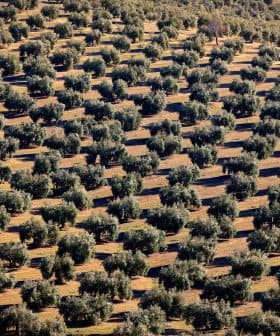USDA Predicts Global Olive Oil Production To Decrease Again
The United States Department of Agriculture predicts that global olive oil production will fall by nearly three percent, to 3.03 million tons, in the 2020/21 crop year.
Global olive oil production is expected to decrease in the 2020/21 crop year for the third consecutive year, with the USDA estimating a drop to 3.03 million tons from 3.12 million tons in the previous year. The decrease is primarily attributed to lower production in the European Union, while global consumption is predicted to increase due to growing awareness of olive oil’s health benefits and low prices.
Global olive oil production is predicted to decrease for a third consecutive year in the 2020/21 crop year, according to a recently published report from the United States Department of Agriculture.
The USDA estimates global production will drop to 3.03 million tons of olive oil, down from the 3.12 million tons produced in the 2019/20 crop year. These USDA figures are based on reports from the major producing countries as well as information from other public and private sources.
We currently show olive oil consumption following the historic trend of increasing annually between two and four percent
The department estimates that the vast majority of the production decrease will take place in the European Union, with the exception of Spain. On the other side of the Mediterranean, two of the region’s largest producers – Tunisia and Turkey – are expected to have lower harvests than they did in 2019 as well.
See Also:2020 Harvest News“Both Tunisia and Turkey are poised to have off years with Morocco looking for an on year,” USDA senior agricultural economist Bill George told Olive Oil Times. “With us currently showing the E.U. [which is responsible for two-thirds of global olive oil production] as being nearly flat year-to-year in 2021, our global production is reduced.”
Olive oil analysts in Spain largely agree with the USDA estimates and expect the 2020/21 crop year to resemble the 2018/19 crop year in the Mediterranean basin, in which Spain produced a record-high 1.79 million tons of olive oil.
These analysts also expect production in Greece, Italy, Morocco, Portugal and Tunisia to be similar to what they were in the 2018/19 crop year.
“Pressed olive oil in Spain for 2019/20 was reported by [our] source at 1.2 million tons with the potential for this to increase significantly in 2020/21, possibly exceeding the 1.8‑million-ton historic record,” George said.
While the USDA expects olive oil production to decrease, the department also predicts an increase in global olive oil consumption. The department cited the growing awareness of olive oil’s health benefits coupled with persistently low prices as the reason for the increased consumption.
“We currently show olive oil consumption following the historic trend of increasing annually between two and four percent,” George said. “At the time of our forecast, there was little information suggesting a significant change from the historic trend.”
“Olive oil prices in Spain are down significantly from a few years ago which will help encourage continued consumption growth, though Covid-19 and its impact on incomes and consumption patterns could become a factor limiting consumption growth,” he added.
However, George warned that there was no historical analog for predicting what impact the novel coronavirus will have on global olive oil production or consumption.
“This is a bit of an unknown as we are dealing with an event that has no historic analog. Currently, there is no data suggesting a change from current consumption trends.” George said. “The main concerns are how lasting income declines will persist. Will this, along with restrictions on restaurant dining, reduce demand for olive oil?”
“Basically, the two concerns are how [long] the Covid-19 impacts persist and the degree of those impacts,” he added. “Perhaps it’s a bit early to make any significant alterations to current forecasts of consumption given the lack of hard data and historic analogs.”
In the report, the USDA also predicts that increasing consumption and decreasing production will lead to a decline in the E.U.’s olive oil stocks.
The decreasing supply of olive oil on the market and in private storage, the USDA reasons, should lead to a slight price recovery in the 2020/21 crop year.
However, George said that if there were to be record-high production levels once again in Spain, they would offset the dent otherwise being created in those olive oil stocks
“Expanded production in Spain, adding to E.U. production, will only be a negative on prices as global and E.U. carryover into the new year are at recent highs,” he said.
Among the various other highlights of the report, E.U. exports are expected to grow to 725,000 tons, which will also help lower the trading bloc’s massive stocks.
On the other side of the Mediterranean, Moroccan exports are expected to double to 45,000 tons. The department cited government initiatives at growing the sector as part of the reason for this monumental increase.
“In North Africa and the Middle East, investments in olive oil processing and government policies aimed at increasing exports are slowly driving growth,” the USDA report said.
However, in nearby Tunisia olive oil production is likely to decrease drastically as many of the country’s trees enter an off-year. This is expected to lead to a 35 percent decrease, with the North African country exporting a total of 130,000 tons.









